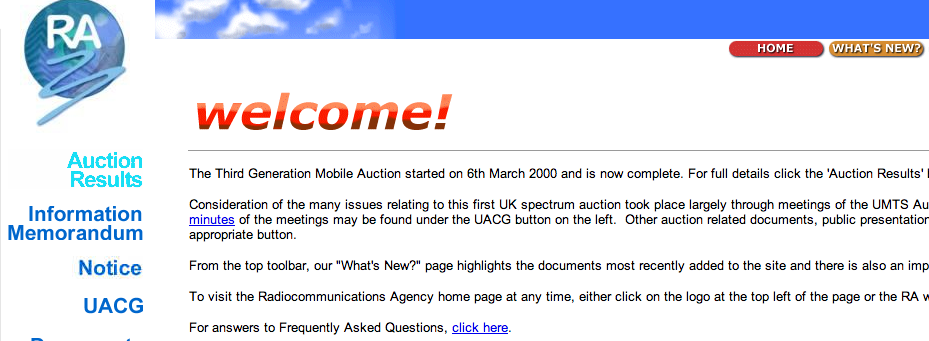This is about psychology, and a quick way of using it to get more mailings for your launches.
It’s a way of helping your top JVs feel invested and excited, and giving them something they want to fight for.
It’s also what caused the top executives of an entire industry to suffer a fit of collective insanity that cost them £17 billion.
This happened in the year 2000, when people still knew what Netscape was and the internet looked like this:

We didn’t even have 3G, and that’s why the madness started. The UK government was auctioning off the spectrum for the mobile phone companies to use on their networks.
This was one of the first 3G auctions, so it attracted a lot of interest. The bidding was conducted in several rounds – each company submitted a bid for each of the 5 potential licences, and at the end of the day it was made public knowledge who was winning and how much they’d bid.
The next day, everyone got to bid again.
And a funny thing happened.
You’d expect companies to make their bids associated with costs and benefits.
If you know you can make $1000 from an asset, you don’t offer to buy it for $1500.
And initially, that’s what happened. BT estimated the value of their chunk of 3G spectrum to be £300 million.
Their final bid was £4 billion.
Vodafone paid almost £6 billion for their licence.
The telecoms industry collectively spent £22.5 billion on the UK 3G licences. That’s £17 billion more than they could reasonably expect to make back.
What happened is called the Endowment Effect.
We value something more when we own it.
Daniel Kahneman ran a study in which half the group were given coffee mugs. They were then given the chance to sell these mugs to the other half of the group, if they could agree a price.
Very few mugs were sold. A poll afterward revealed that most students wouldn’t sell their mugs for less than $5.25, but most wouldn’t buy for more than $2.25.
You can see the same effect in the housing market, with people convinced their home is worth an unrealistic amount.
The curious thing is that this even works when we almost own something. Those telecoms executives saw that one day, they were on top of the bidding. The licence was ‘theirs’.
The next day, someone had bid higher. It had been taken away from them.
And anyone with faith in these incredibly well-paid, smart executives would like to think they’d go back to considering their costs and benefits and make a sensible decision for their company.
Their actual thought process followed the FTS Principle – something you’re no doubt familiar with when someone tries to take away something you consider yours.
It was, in its entirety:
Fuck. That. Shit.
And this brings us back to JVs.
A lot of people will run big JV competitions, thinking that massive prizes will attract loads of affiliates.
They won’t.
They’ll attract a couple, but the only people who care about your $10,000 top prize are the ones with a vampire’s chance in the Sahara of winning it, and there’s a good chance you know them well enough that they’d promote anyway. Your competition is a tie-breaker, not a honey-trap.
But where competitions come into their own is through the endowment effect.
It kicks in as soon as you send out that first leaderboard mailing.
Maybe your affiliates weren’t that bothered about your $200 5th-place prize when they signed up to promote.
But when they find they’re in line to win it, it becomes a LOT more important.
Often, it’ll be important enough to justify a second, third and fourth mailing – especially if the guy they might lose it to is a mate. Losing something is hard. Losing something to someone who’s going to rub it in your face next time you have a Skype chat… well, let me refer you back to the FTS Principle above.
Of course the amount of money does matter – bigger amounts are worth more. But the driver is this fear of loss. That’s why, on your JV leaderboard, you should make sure everyone knows just how precarious their position is, and make a big thing of it when the rankings change.
In something like a launch, there’s nothing as exciting as fighting to keep hold of what’s yours.
And the best part is that no-one’s a loser. In the 3G auction, the telecoms companies massively overpaid for the assets. Their share prices tumbled.
But during a launch, no-one’s losing money. Everyone’s making it.
This is just one of the tools you’ve got to make sure everyone makes more.



Hey Neil, awesome post here! and I totally agree with you on the Leaderboard and JV prizes being a “sweetener” to get people to come on board (many of my friends would have promoted anyway without the JV prizes).. and the psychological push kicks in once the 1st leaderboard update goes out, and it spirals from there from one’s constant update.
good stuff!
Cheers Lester – I’ve seen people send out multiple mails in one day for your offers, so you’ve definitely got this effect down. Of course, the hot products help too